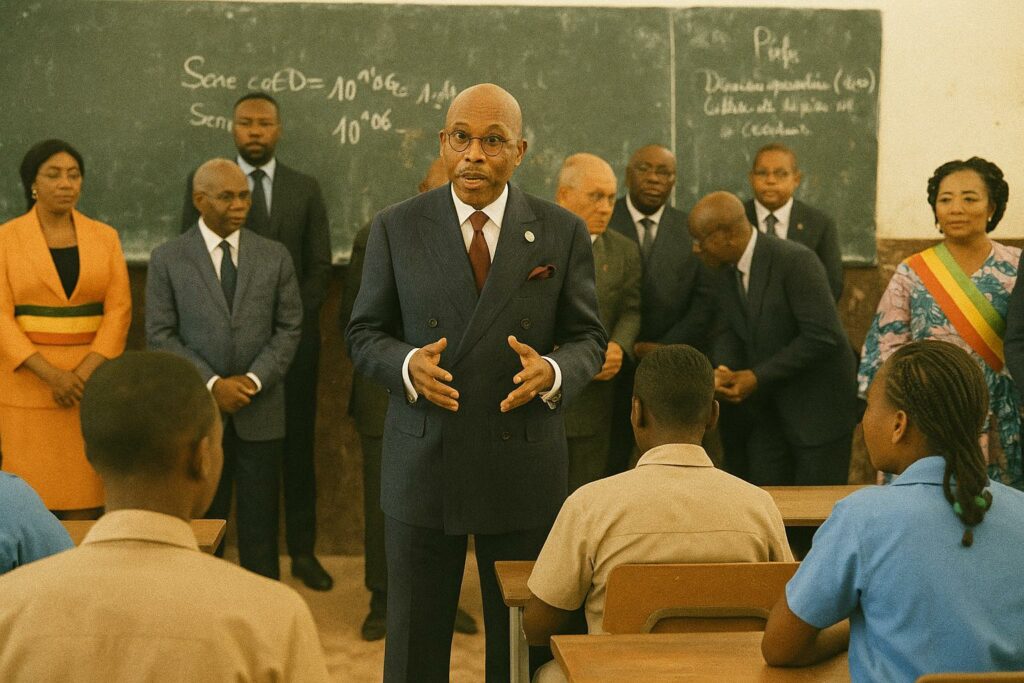A well-choreographed academic marathon
When the last scripts of the BEPC are collected on 18 July, Congo-Brazzaville will have guided more than half a million pupils through a three-stage national evaluation cycle that began with the CEPE in early June. According to data released by the Ministry of Pre-School, Primary, Secondary and Literacy Education (MEPPSA), the country’s examination calendar has remained unperturbed by the regional disruptions that have occasionally affected Central Africa’s school systems (UNESCO 2024). The smooth sequencing—from primary gateways to the baccalauréat—has been interpreted by several diplomatic observers as a sign of administrative maturity and political stability.
An infrastructure calibrated for 125,254 young contenders
This year’s BEPC brings together 125,254 candidates in 540 examination centres, a geographical spread that mirrors national demographics more evenly than in previous cycles. Senior officials at the Directorate of Examinations and Contests underline that every centre holds backup power units and duplicate examination materials—a redundancy plan refined after the 2022 electrical outage in Pool Department, which forced emergency rescheduling. The Ministry’s logistical branch reports that more than 95 per cent of centres now use electronic attendance scanning, an innovation funded in part by the World Bank’s Education Sector Support Project (World Bank 2023).
Integrity measures in an era of digital temptation
The rise of encrypted messaging applications has compelled Brazzaville to reinforce exam security. Candidate guides posted in every school explicitly prohibit mobile phones, programmable calculators and smartwatches. Supervisors are equipped with handheld signal detectors, while sealed subject trunks remain under gendarmerie escort until the minute of opening. Any infraction may trigger a three-year disqualification, a sanction introduced after the 2019 leak that briefly went viral on social media. National teachers’ union spokesperson Michel Mabiala praises the new vigilance for “restoring a sense of meritocracy that parents were beginning to question.”
Diplomatic subtext: education as a soft-power instrument
For President Denis Sassou Nguesso, whose government has identified human-capital development as a pillar of its National Development Plan 2022-2026, the serenity surrounding the exam season has strategic resonance. Foreign embassies in Brazzaville increasingly cite education statistics when drafting investment briefs, arguing that a predictable school calendar lowers operational risk. A European diplomat notes that “multinationals scrutinise classroom indicators with the same zeal they reserve for macro-economic tables”. The structured conduct of the BEPC thus complements broader efforts to project the Republic of the Congo as a secure destination for both capital and ideas.
Voices from classrooms and corridors
At Lycée Chaminade in Pointe-Noire, fifteen-year-old candidate Nadine Kiala describes the pre-exam ambience as “tense but disciplined,” crediting teachers for weekend revision clinics organised in cooperation with the local Parent-Teacher Committee. In rural Sibiti, headmaster Jean-Claude Itoua emphasises the novelty of receiving candidate badges a full fortnight in advance, a first in his two decades of service. These testimonials underscore a message echoed by civil-society watchdog Observatoire de la Vie Éducative: incremental administrative improvements, rather than sweeping reforms, are quietly boosting public confidence.
Beyond the 2025 cohort
Once results are published, attention will pivot to the 29 July entrance examination for the elite schools of Oyo and Mbounda. Officials hint at piloting computer-based testing there, an experiment that, if successful, could reach the BEPC by 2027. Meanwhile, the Ministry’s Directorate of Planning is finalising a digital registry designed to track individual learner trajectories from preschool to tertiary education, a project advised by the African Development Bank. Such initiatives suggest that the logistical finesse displayed in 2025 is less an isolated triumph than a rehearsal for deeper systemic transformation.

